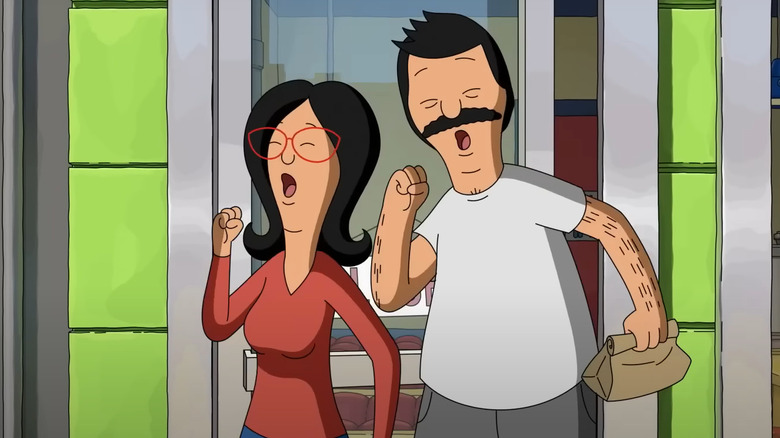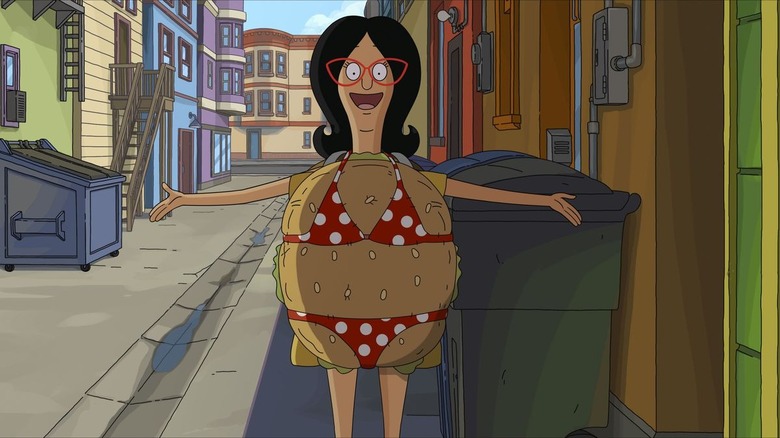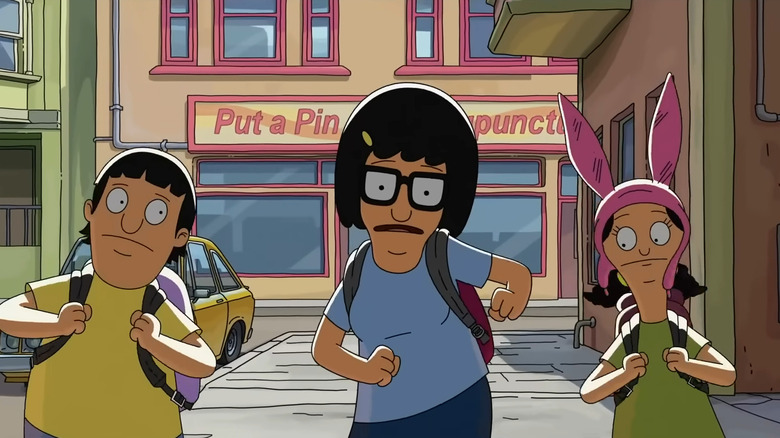The Bob's Burgers Writers Know When It's Time For Jokes To Take A Backseat
Adult animation has a strong history in television, with "The Simpsons" currently holding the title as the longest-running scripted American primetime television series at 34 seasons. The success of the show proved to audiences and studios alike that there was an untapped market for animation meant for older audiences, allowing shows like "Family Guy," "South Park," "King of the Hill," "Rick and Morty," and countless others to thrive. Some of these shows are far more adult than others, but with such an expansive medium, there's something for everyone's taste.
In some instances, adult animation can be just plain silly. That's where a show like the hugely-popular "Bob's Burgers" comes in, an animated series from the mind of Loren Bouchard which follows a family that should probably not be in charge of a restaurant ... in charge of running a restaurant. They're the kind of family where getting glued to a toilet seat is a normal Tuesday, where insults are always rooted in affection, and where a teenager can lust after zombie butts in judgment-free peace. That's just who the Belchers are.
They're also the kind of family that snags 13 (and counting) successful seasons, as well as a solid, theatrically released film. The question is, then, what's their secret? How can Bouchard and his team of writers keep the Belchers afloat for so long? Well, as it turns out, part of the answer is to deny them the best zingers.
Jokes never replace quality
In a human-interest spotlight for The New York Times, writer Carina Chocano dives into Loren Bouchard's personal history and shares what it's like to sit in on a Zoom writing session for an episode of "Bob's Burgers." Chocano summarizes that experience by saying:
"I was struck not only by the ease and lack of hierarchy — like a family writing about a family — but by the way that, as adjustments were made to a script, the better joke didn't always win; pacing, tone, and trueness to character were more essential. The show's humor ... is so character-driven as to be almost fragile. Each line needs to be delivered just so, or it risks throwing off the entire scene."
Need a more specific example? Chocano's got one locked and loaded.
"I saw [Bouchard] attend to a last-minute query: Louise was delivering a rousing speech in her usual sarcastic way, and the words were underscored with some rousing music. But was it too rousing? It seemed funny to me, but Bouchard's ear decided against it. If people took it seriously, it might come across as manipulative, insincere."
In these few sentences, we get a glimpse into what the writing team values most — not the bit but rather the whole. If a clever piece of dialogue or a funny joke or even a beautiful piece of music doesn't support the overall tone, then it's removed. "Bob's Burgers" is a show praised for its relatability, and it's a testament to the creative team that they're willing to "kill their darlings," so to speak, in order to keep the show's heart.
A messy, melodic exception
For the musical numbers, however, the creative process is a little bit different. In an interview with Vice, Loren Bouchard and Nora Smith — a prominent writer and executive producer on "Bob's Burgers" — explain how the journey can sometimes be, well, utter chaos. The bulk of the songs are written out of a desire to make the credits a more memorable viewing experience, and are often hyper-specific jokes that reference bits from the episode but would never make sense if they were spliced into the actual moment. "If you leave 'em dancing if you have a little snappy number at the end of the episode, it has a powerful, almost effect," says Bouchard. "It tricks you into liking the show more than you might have otherwise."
Of course, most of the numbers that appear during the episodes themselves are as strictly conceived as the rest of the writing. In the above Vice article, Bouchard explains how, when the time comes for a musical number, the episode is typically planned with the appropriate framework in mind and, even if it isn't, the structure is ultimately reframed. It's fitting, somehow, that the most outlandish aspect of "Bob's Burgers" is also the least conventionally formatted. Sure, the image of cohesiveness proliferated by the New York Times article is likely a little more flexible in reality, but it at least makes the team just a little more relatable, just like The Belcher family.


